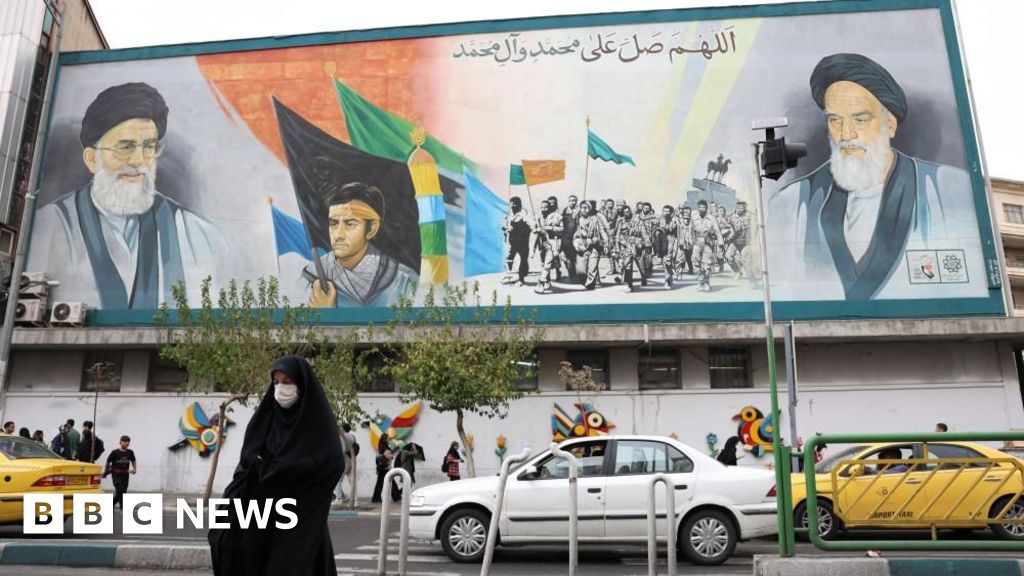Israel’s attack against Iran intensifies the war in the Middle East. Ayatollah Ali Khamenei, Iran’s supreme ruler, and his advisors are primarily concerned with avoiding, or risking an even worse escalation.
They must choose the least bad option from a number of difficult options. On one end, a new wave of ballistic rockets is launched. Israel has already warned that it will retaliate if this happens.
The other side decides to put an end to the destructive exchanges between direct attacks on their respective territory. If Iran continues to fire, it risks looking weak, intimidated, and deterred, by Israel’s political and military determination, backed by the United States.
The supreme leader, his advisers, and the Iranian government will likely take the final decision that they believe is the least harmful to the survival of the Islamic regime.
What are empty threats?
In the hours leading up to and following Israel’s attacks, Iran’s official press carried defiant declarations that, on face value, suggested the decision to react had already been made. Its language is similar to Israel’s, which cites its right to defend against attack. The stakes are so high, Iran may decide to back down on its threats.
Sir Keir starmer, the British Prime Minister, hopes that Israel acted in self defense.
He said: “It is clear to me that Israel has a right to defend itself from Iranian aggression.” “I am equally clear that there is a need to avoid escalation in the region and I urge all parties to show restraint. Iran should not react.”
Iran’s statements have been consistent ever since its ballistic rocket attack on Israel on the 1 October. Abbas Araghchi, Iran’s foreign minister, told Turkey’s NTV channel a week ago that “any attack against Iran will be considered a crossing of a redline for us.” This attack will not be ignored.
Esmail Baqai, spokesperson for the Iranian Foreign Ministry, said hours before the Israeli strikes: “Any aggression of the Israeli regime against Iran would be met with full strength.” Esmail Baqai, the Iranian Foreign Ministry spokesperson, said that “any aggression by the Israeli regime against Iran will be met with full force.”
While the Israeli aircraft was returning to their base, Iran’s Foreign Ministry invoked its right of self-defense “as enshrined by Article 51 in the UN Charter”. Iran’s Foreign Ministry said in a statement that it believed it had both the right and obligation to respond to foreign aggression.
Deadly exchanges
Israel has been the driving force behind the escalation of violence since the spring. Iran is seen as the key backer of Hamas’ attacks on 7 October, which killed around 1,200 people (Israelis and more than 70 other nationals). Iran, fearing that Israel would be looking for an opportunity to strike, repeatedly signaled that it didn’t want a full-on conflict with Israel.
It does not mean that it is prepared to stop the constant, deadly, but lower level pressure on Israel and its Allies.
The men of Tehran thought that a full-scale war was a better option than a peaceful solution. Iran attacked Israel using its allies and proxies from the so-called “axis for resistance”. The Houthis of Yemen destroyed and blocked shipping in the Red Sea. Hezbollah rockets fired from Lebanon forced 60,000 Israelis to leave their homes.
Israel’s retaliation six months into the war forced perhaps twice as much Lebanese to leave their homes in southern Lebanon, but Israel was ready to do more. It warned Hezbollah that it would take action if they did not stop firing at Israel and move away from the border.
Israel decided to leave the battlefield shaped by Iran’s limited but attritional conflict. It delivered a series powerful blows which threw the Islamic government in Tehran off-balance and shattered its strategy. After the latest Israeli strikes, Iranian leadership is left with only difficult choices.
Israel interpreted Iran’s reluctance in fighting a full-scale war as weakness and increased pressure on Iran and its allies. Prime Minister Benjamin Netanyahu, and Israel’s commanders, could afford to take risk. They had the unwavering support of President Joe Biden, and a safety net in the form of massive munitions deliveries, as well as his decision to send significant American air and sea reinforcements to the Middle East, to back up the US commitment for Israel’s defense.
On 1 April, an Israeli airstrike in Damascus destroyed part of the Iranian diplomatic compound. It killed a senior Iranian commander, Brig. Gen. Mohammed Reza Zahedi along with other senior Iranian officers from the Islamic Revolutionary Guard Corps.
The Americans were furious because they hadn’t been warned or given enough time to alert their own forces. Joe Biden’s support for Israel did not waver, even as it faced the consequences of their actions. Iran launched a series of attacks on 13 April, using drones, ballistic and cruise missiles. Israel’s defences shot down the majority, with help from the US, UK France and Jordan.
Biden asked Israel to “take victory” in hopes that this would stop the most dangerous moment of the Middle East war. Biden’s plan appeared to be working when Israel limited its response to a strike against an air defence site.
Israel has escalated its war against Iran and its allies and proxies on several occasions since the summer. The biggest blows came in a major attack against Iran’s closest ally in Lebanon, Hezbollah. Iran spent years building Hezbollah’s arsenal as a crucial part of its defence. Israel’s attack on Iran was deterred if they knew that Hezbollah could hammer Israel just across the border in Lebanon.
Israel was the first to act, implementing its plans that it had developed after Hezbollah brought it to a halt in the 2006 war. It destroyed booby-trapped pagers and walkie-talkies that it had tricked Hezbollah to buy, invaded south Lebanon, and killed Hezbollah leader Sheikh Hasan Nasrallah. Nasrallah had been a symbol for defiant opposition to Israel for decades. Israel’s offensive against Lebanon has killed over 2,500 people and displaced more that 1.2 million, according to the authorities in Beirut. The country was already on its knees due to its economic collapse.
Hezbollah continues to kill Israeli soldiers in Lebanon and fire a large number of rockets. It is in a state of disarray after losing its leader, and a large part of its arsenal.
Iran’s strategy was on the verge of failure, so it decided to strike back. Its position as a leader of anti-Israeli, anti-western forces would be destroyed if it allowed its allies to die and fight without responding. Its response was a much larger ballistic missile strike on Israel on 1 Oct.
Israel’s response was the airstrikes of Friday, 25 October. It took longer than expected. Leaks about Israeli plans may have played a role.
Israel is also launching a major offensive against the northern Gaza Strip. Volker Turk, the UN’s human rights chief, called it the darkest hour of Gaza’s conflict, as the Israeli military subjected an entire population of Gaza to bombings, sieges, and the threat of starvation.
It’s impossible to tell from the outside if Israel’s attack on Iran was timed to divert international attention away north Gaza. It could have been part the plan.
Stopping an escalation spiral
When the countries involved believe that they will be seen weak and deterred if they do not respond, it is difficult to stop successive rounds and counter-strikes. This is how wars spiral out of control.
It is now a question of whether Iran is willing to give Israel the final word, at this stage in the war. President Biden supported Israel’s decision that it would retaliate against Iran after 1 October. He tried to prevent a more deadly escalation by publicly telling Israel not to bomb Iran’s most important assets – its nuclear, oil, and gas installations. He increased Israel’s defenses by deploying THAAD anti missile system to Israel. Prime Minister Netanyahu accepted his advice.
Israel and Iran are both calculating what will happen next based on the results of the American elections, which take place on 5 November. If Donald Trump wins a second term, he may be less concerned about retaliation by Iran, if that happens, in the form of strikes on oil, gas and nuclear facilities.
The Middle East is once again waiting. Israel’s decision to not strike Iran’s most valuable asset could, perhaps, allow Tehran to postpone its response, if only long enough for diplomats do their work. Last month, Iran suggested that it was open to a second round of nuclear talks at the UN General Assembly.
All of this should be important to the rest of the world. Iran has always denied wanting a nuclear weapon. But the nuclear expertise and uranium enrichment have brought a weapon to its fingertips. Its leaders are probably looking for new ways to deter their adversaries. It is possible that they are working on a nuclear warhead to be fitted onto their ballistic missiles.
Read More @ www.bbc.com




